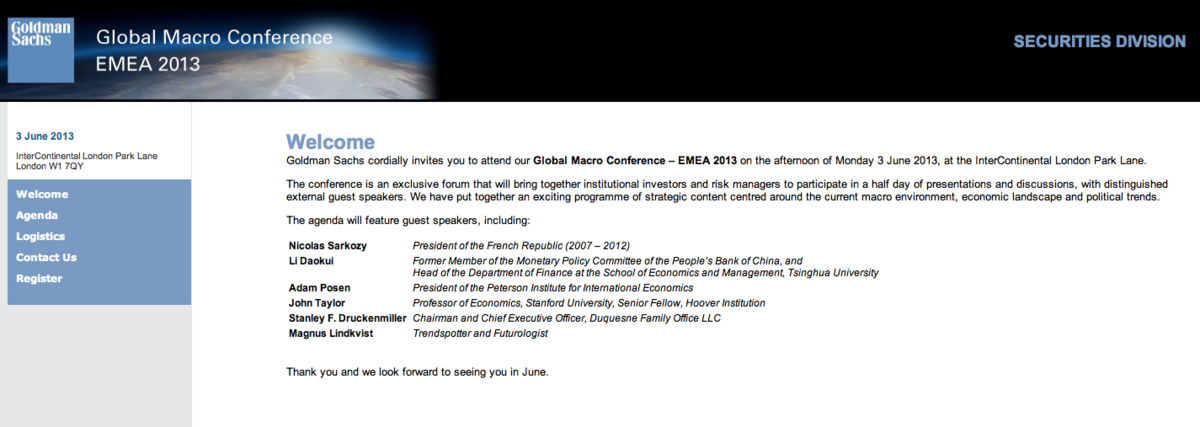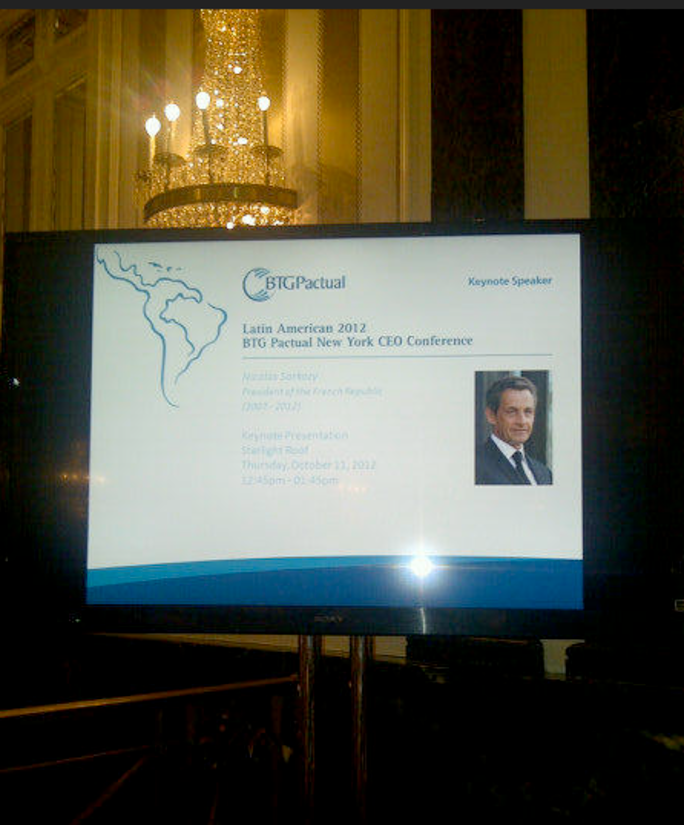Former French President Nicolas Sarkozy, who once decried "a financial capitalism" which had "imposed its logic on the whole economy and contributed to perverting it", has now joined the ranks of star conference speakers for the investment banking behemoth Goldman Sachs.
As announced on the bank’s website, Sarkozy is to be one of the “distinguished” speakers at Goldman's Global Macro Conference held at the Intercontinental Hotel in London on June 3rd.
The conference, which is oversubscribed, is described as "an exclusive forum that will bring together institutional investors and risk managers to participate in a half day of presentations and discussions, with distinguished external guest speakers". Sarkozy, the only politician invited to speak, will share the platform with Chinese and American economists, a wealth manager and Swedish futurologist Magnus Lindkvist.

Enlargement : Illustration 1

While the economic crisis that put financial capitalism in the spotlight deepens, Sarkozy has, since losing last year’s presidential elections, given speeches at several international finance forums. The former president's sudden enthusiasm for a sector where nothing passes for free raises a number of questions, not least that of conflict of interest both past and present.
Goldman Sachs has not publicly disclosed Sarkozy's remuneration for the upcoming conference in London. But participants typically pay several thousand pounds to attend such international meetings with prestigious, renowned speakers who are extremely well paid. According to various press reports, the former president is among the circle of global celebrities who can command over 100,000 dollars, or about 77,000 euros, to appear.
Earlier this month, Mediapart contacted the person responsible for organising conferences at Goldman Sachs and submitted the following questions: why had the bank invited Sarkozy? When was the decision to invite him taken? How much would he be paid and how much would participants at the conference pay to attend? While the Goldman employee promised to provide answers "very quickly", none have yet been received.
Goldman Sachs is in little need of Sarkozy’s services to provide an inside view of what goes on in Brussels or Frankfurt, where a number of top-level insiders, most notably Mario Draghi, chairman of the European Central Bank, are former high-ranking employees of the American investment bank. Whatever the reason, Sarkozy has enjoyed good relations with the Goldman network of late: among the backers of a 1-billion-euro private equity fund being put together by Sarkozy, called Columbia, is Simon Robertson, a British banker who is a former president of Goldman Sachs Europe.
Private visits with presidential welcomes...
After his election defeat in May 2012, Sarkozy announced he would begin a new life away from France. He has never made a secret of his desire to make money, just as former British Prime Minister Tony Blair did after leaving office in June 2007 – Blair assembled a fortune estimated at several million pounds in a matter of a few years. Over the past year, Sarkozy has managed to clock up three speaking engagements for investment banks, including that for Goldman in June.
In early September 2012, Sarkozy denied reports he was to chair a meeting organised by investment bank Morgan Stanley for a fee of 250,000 euros. Three weeks later he was listed as a guest at a private meeting in New York on October 11th organised by Brazilian investment bank BTG Pactual. He was the only non-South American participant.

Then, on October 22nd, Sarkozy travelled to Brazil to take part in a seminar, also organised by BTG Pactual, nicknamed 'the Goldman of the Tropics'. The Economist profiled the bank just before its Initial Public Offering in March 2012, when, like Goldman itself in an earlier time, its shares were being offered at a sum thought to be roughly three times the bank's book value.
BTG Pactual has a curious history. It was built by Andre Esteves, who started out as a systems analyst and ended up buying out the bank's owners. He then sold it to UBS in 2006 for 3.1 billion dollars, at which point it became the spearhead for the Swiss bank's wealth management business in Brazil. It was at this time that Banco Pactual set up its own banking and trading group, which would give it the epithet BTG – which some insiders say, jokingly, satnds for ‘Better Than Goldman’.
Two years later, Esteves bought the bank back from UBS for considerably less than its sale price – just 2.5 billion dollars. The price difference might be explained by the fact that, at the time, the Brazilian authorities, unhappy that Brazilian wealth was being taken offshore, had accused UBS of tax fraud and money laundering.
The bank, renamed BTG Pactual and owned by a Bermuda-based holding company, became the top investment bank in Brazil and is now prominent in the City of London, where it hired a French banker, Charles Rosier, formerly with Goldman Sachs before becoming head of UBS for France, Belgium, Spain and Portugal.
There is a certain logic to Sarkozy's link with BTG Pactual. During his supposedly private trip to Brazil for the conference he was received by Brazilian President Dilma Rousseff, and the issue of the Brazilian Army's interest in buying French-made Rafale fighter jets was discussed at length. Three companies are competing for the 8-billion-euro contract, including Dassault Aviation, which makes the Rafale. During his presidency, Sarkozy strongly backed Dassault, including promising Brazil with a technology transfer should it pick the French plane.
During Sarkozy’s trip to Brazil last October, the Brazilian press also devoted space to BTG Pactual's ambitions in Africa, and the help Sarkozy could provide with this given his contacts there, in particular in the field of mining. In May last year BTG Pactual launched a 1-billion-dollar investment fund for Africa.
Sarkozy's third link with the investment banking world is via Alfa Bank, the financial arm of a vast Russian conglomerate. He was invited to Moscow on November 13 last year by the oligarch Mikhail Fridman, who sits on the bank’s board, to present awards for the best investments in Russia. While in Moscow, Sarkozy was received in grand style by Vladimir Putin.
...and a little help from his friends
On December 11th 2012, Sarkozy went to Doha at the personal invitation of the Emir of Qatar. He was invited to the World Sport Forum, his first public presentation since leaving office. The event was organised by Richard Attias, an advertising executive who is married to Sarkozy’s ex-wife Cécilia.
Sarkozy, who is known to have friendly relations with the authorities in Qatar, went to considerable trouble to put the Emirate in touch with the Fédération International de Football Association (FIFA). And in a surprise move, Qatar won its bid to host the football World Cup in 2022. Sarkozy also argued publicly that the date of the competition should be changed so that it could be held in winter rather than in Qatar's baking hot summer.
Officially the trip to Doha in December 2012 was a courtesy visit. But at the same time, in an invidious mixing of interests, Sarkozy, who is also a business lawyer, defended Qatar in a dispute with the king of Morocco, another of his friends. The kingdom had vetoed Qatar's purchase of a stake held by French telecommunications company Vivendi – with which Sarkozy also has friendly relations – in the Moroccan telephone operator Maroc Télécom.
In return Qatar, as reported in the Financial Times, was prepared to invest some 250 million euros in Sarkozy's investment fund. And in this case too, it would appear that Qatar was as interested in taking an option on the future as in thanking Sarkozy for past favours.
However, the public revelations about the fund have stalled the project, according to sources in Sarkozy's inner circle, who say he has put it on ice in order to keep his options open for a return to the political scene.
As a former president, Sarkozy is a member of France’s Constitutional Council, the Conseil Constitutionnel, raising a clear question of conflict of interest, an issue which the Constitutional Council has apparently chosen to ignore.
For while turning his network of political and business contacts into a money earner as a conference speaker, a business lawyer and an adviser to an investment fund, Sarkozy is also keeping open the possibility of returning to play a prominent political role in the future.
Meanwhile, it is conspicuous that amid all these roles, and despite all his travelling, Sarkozy has not chosen to put his renown and his newfound availability at the service of humanitarian causes like the fight against hunger, illiteracy, malaria or AIDS or for promoting medical research.
-------------------------
English version by Sue Landau
(Editing by Graham Tearse)


